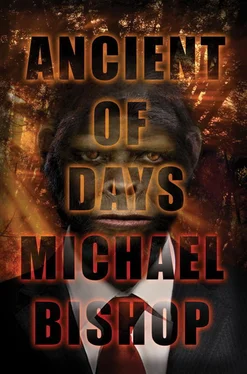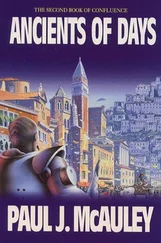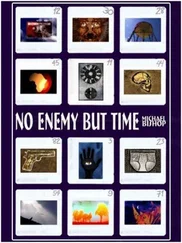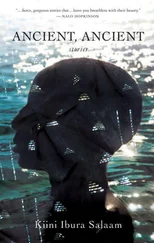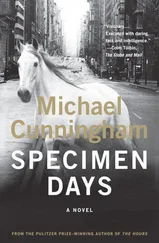A hundred yards or so beyond the tent, a quick flash of light. I halted, blinked, looked again—but now the corridor of sentinel pecans was empty of any intruder but the keening wind.
“Mistah Paul, you better move your fanny fas’ if you wanna see this!” I moved my fanny fast. After skidding in the frost-rimed mulch, I whipped aside the tent flap, edged inside, and found RuthClaire flat on her back on a mound of blankets and ancient bed sheets spread out on a plastic drop cloth. Adam knelt to one side of his wife, but Livvy squatted between her legs—legs bundled in a pair of those ugly knit calf-warmers worn by women in aerobic-dancing classes—guiding from her womb the mocha-cream-colored product of her pregnancy.
“I told you it’d be easy!” RuthClaire cried, letting her head fall back and laughing.
Livvy did something sure-handed to the umbilical cord, then lifted the minuscule infant by its ankles, bracing its back with one hand and showing it first to Adam and then me. It was a boy, but a wizened and fragile-looking one. When Livvy slapped him on his angular buttocks, he sucked in air and wailed. Surprisingly, the sound lasted only a few brief seconds. Evolution on the Serengeti grasslands, I later came to realize, had selected for habilines whose newborns shut up in a hurry.
“Ain’ he a dandy!”
I put the afghan around Livia George’s shoulders. Adam reached into the wings of the towel swaddling the baby to touch his son’s head. Something like a smile flickered around Adam’s lips.
“Okay,” I said. “Ruthie’s proved she’s game enough to bear her child in the back yard. Now let’s get inside.”
“Got a little bidness to take care of yet.” Livvy handed the baby to its father. She knelt and massaged the undersides of RuthClaire’s thighs. Then she began to push gently on her slack, exposed abdomen, to encourage the expulsion of the placenta. “Y’all go on in. Nothin’ else for you to do out here.”
But before Adam and I could exit, two strangers shoved their way into the tent.
First, a blond man in a double-breasted safari jacket confronted us. Behind him, balancing a portable video unit on his denim-clad shoulder, was a slender black man. These intruders were so businesslike about deploying their equipment and their persons in the cramped interior that I considered the possibility that Adam and RuthClaire had hired them to video-tape their baby’s delivery. If so, they were late.
“I’m Brad Barrington of Contact Cable News,” announced the blond intruder. “My cameraman, Rudy Starnes.” The black man gave a perfunctory nod. “Well, well, well. Is this little fellow the Montaraz baby?” He chucked the newborn under the chin with a gloved finger. “Looks like we underestimated the time it’d take us to get through the woods, Rudy. The big show’s already come off.”
“Sun lamp’s giving us plenty of light to shoot by, Brad. Maybe I can do some reenactment footage to save the situation.”
“Yeah,” said Barrington. “And on-the-scene interviews.”
Grimacing, RuthClaire raised up on her elbows. “What in pity’s name do you guys think you’re doing?”
“You’re trespassing,” I told them. “You sneaked onto Paradise Farm from Cleve Snyder’s property.”
A microphone in his fist, Barrington duck-walked beneath the tilted sun lamp to RuthClaire’s shoulder, where he asked if it had been a difficult delivery. Leaning into the mike, RuthClaire emitted a piercing scream. Barrington recoiled, almost doing a pratfall. Livia George, meanwhile, had slid the glistening placenta into a piece of torn sheet. Her manner implied that the appearance of the two-man Contact Cable News crew was none of her affair. If nothing else, it was preferable to a hurricane.
“Who’s doing security tonight?” I asked. (I always forgot the guards’ names.)
“Chalmers,” RuthClaire replied, spitting out the word.
Barrington, looking more annoyed than abashed, approached her again with the microphone. “Don’t you think this landmark event deserves a permanent video record? Don’t you feel any sense of obligation to history?”
RuthClaire, her breath ballooning, said, “Don’t you feel any sense of shame, hanging over a half-naked woman with that instrument of psychic rape in your fist?”
A thin veil of confusion fell across the newsman’s face.
“Get out of here,” I told him. “My first and last warning.”
“Let’s go, Brad,” the black man said. “This ain’t working out.” Almost certainly at his partner’s bidding, Starnes had just hauled a ton of equipment across five or six hundred yards of wintry darkness, and nothing was going as planned.
“Keep shooting,” the blond man told him.
“Brad—”
“This is a scoop! You see anyone down here from Channel Five or Eleven Alive? You know anybody else who staked out this place for three ass-freezing days?”
“Nobody else that dumb.”
I slipped outside and called for Chalmers, the guard. That did it for Starnes. He decamped, abandoning his associate to whatever fate he chose to fashion for himself. He was hiking speedily off through the pecan grove, his equipment banging, when Chalmers came trotting around the corner of the house with his pistol drawn. The guard started to pursue the cameraman.
“Let him go,” I said. “It’s the talking head in the tent who needs his butt run in.”
Matters unraveled confusedly after that. RuthClaire was yelling at Barrington to go away, go away, and Livia George came out into the cold with the infant, nodding once at the house to show us that she was taking him indoors. Chalmers, a tall young man in an official-looking parka, started to go into the tent after Barrington when Barrington fell backward through the tent flap with Adam’s head in his stomach and his arms pinioned to his sides. In a rapid-fire falsetto utterly unlike his on-the-air baritone, he was pleading for mercy—but he landed on his back with a loud expulsion of breath and immediately fell silent. Adam was all over him like a pit bull, leaping from flank to flank over the reporter’s prostrate form, baring his teeth and growling as if rabid. RuthClaire emerged from the tent, too. Her blood-stained dressing gown hung to her ankles, her incongruous maroon leg-warmers visible just beneath its hem. She grasped one of the tent’s guy ropes for support.
In a tone of rational admonishment, she said, “Adam, I’m okay. That’s enough.”
Through the fog of his rage, Adam still heard her. He stopped, Barrington’s body rigid beneath him, and looked up sightlessly at Chalmers and me. Slowly—almost shockingly—sanity returned to his eyes, and he pushed himself off the reporter with his knuckles and stepped away from his whimpering victim.
“I want to hold my baby,” RuthClaire told him. “Take me in.”
Still trying to compose himself, Adam escorted her to the house. Chalmers and I remained outside with Barrington, the guard pointing his pistol at the newsman’s head. What now? Were we within our rights to shoot the trespasser?
Barrington stopped whimpering. Seeing me upside-down, he asked if he could have a cup of coffee before he called his station for a ride back to Atlanta. “That damned Starnes. He’s probably to Newnan by now.”
Chalmers said, “If Mr. Loyd presses charges, you won’t be going back to Atlanta tonight. I’ll turn you over to the sheriff in Tocqueville for a little quiet cell time.”
Barrington got off the ground, groaning elaborately, and we argued the matter. If he gave his word that Contact Cable News would never air the least snippet of tape taken tonight on Paradise Farm, I told him, I would forgo the pleasure of pressing charges. I’d be damned, though, if I’d serve him a cup of coffee or let him use the bathroom. Barrington grumped about the First Amendment and Freedom of the Press, but verbally accepted my terms.
Читать дальше
